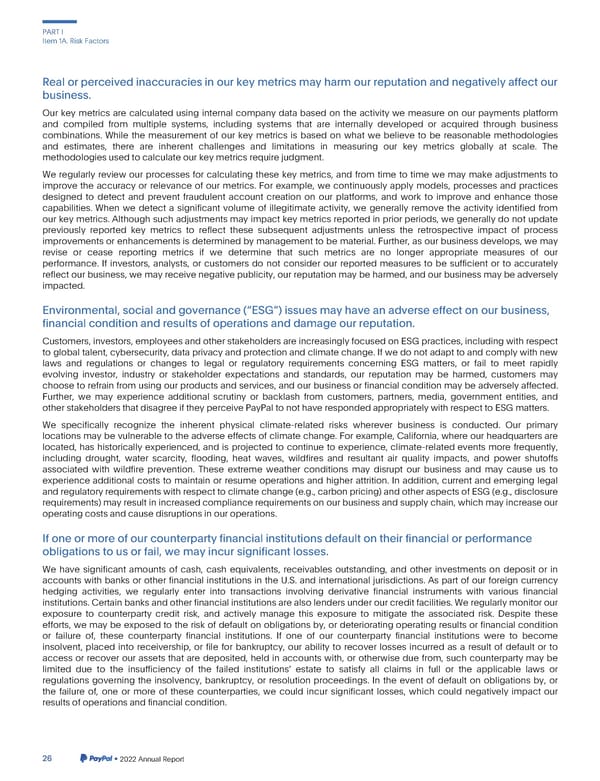PARTI Item1A.RiskFactors Realorperceivedinaccuraciesinourkeymetricsmayharmourreputationandnegativelyaffectour business. Our key metrics are calculated using internal company data based on the activity we measure on our payments platform and compiled from multiple systems, including systems that are internally developed or acquired through business combinations. While the measurement of our key metrics is based on what we believe to be reasonable methodologies and estimates, there are inherent challenges and limitations in measuring our key metrics globally at scale. The methodologiesusedtocalculateourkeymetricsrequirejudgment. Weregularly review our processes for calculating these key metrics, and from time to time we may make adjustments to improve the accuracy or relevance of our metrics. For example, we continuously apply models, processes and practices designed to detect and prevent fraudulent account creation on our platforms, and work to improve and enhance those capabilities. When we detect a significant volume of illegitimate activity, we generally remove the activity identified from our key metrics. Although such adjustments may impact key metrics reported in prior periods, we generally do not update previously reported key metrics to reflect these subsequent adjustments unless the retrospective impact of process improvementsor enhancementsis determinedby managementto be material.Further, as our business develops, we may revise or cease reporting metrics if we determine that such metrics are no longer appropriate measures of our performance. If investors, analysts, or customers do not consider our reported measures to be sufficient or to accurately reflect our business, we may receive negative publicity, our reputation may be harmed, and our business may be adversely impacted. Environmental,socialandgovernance(“ESG”)issuesmayhaveanadverseeffectonourbusiness, financial condition and results of operations and damage our reputation. Customers,investors,employeesandotherstakeholdersareincreasinglyfocusedonESGpractices,includingwithrespect to global talent, cybersecurity, data privacy and protection and climate change. If we do not adapt to and comply with new laws and regulations or changes to legal or regulatory requirements concerning ESG matters, or fail to meet rapidly evolving investor, industry or stakeholder expectations and standards, our reputation may be harmed, customers may choosetorefrain from using our products and services, and our business or financial condition may be adversely affected. Further, we may experience additional scrutiny or backlash from customers, partners, media, government entities, and otherstakeholdersthatdisagreeif theyperceivePayPaltonothaverespondedappropriatelywithrespecttoESGmatters. We specifically recognize the inherent physical climate-related risks wherever business is conducted. Our primary locations may be vulnerable to the adverse effects of climate change. For example, California, where our headquarters are located, has historically experienced, and is projected to continue to experience, climate-related events more frequently, including drought, water scarcity, flooding, heat waves, wildfires and resultant air quality impacts, and power shutoffs associated with wildfire prevention. These extreme weather conditions may disrupt our business and may cause us to experience additional costs to maintain or resume operations and higher attrition. In addition, current and emerging legal andregulatoryrequirementswithrespecttoclimatechange(e.g.,carbonpricing)andotheraspectsofESG(e.g.,disclosure requirements)mayresultin increasedcompliancerequirementsonourbusinessandsupplychain,whichmayincreaseour operatingcostsandcausedisruptionsinouroperations. If one or more of our counterpartyfinancial institutions default on their financial or performance obligationsto us or fail, we may incur significant losses. Wehave significant amounts of cash, cash equivalents, receivables outstanding, and other investments on deposit or in accounts with banks or other financial institutions in the U.S. and international jurisdictions. As part of our foreign currency hedging activities, we regularly enter into transactions involving derivative financial instruments with various financial institutions. Certain banks and other financial institutions are also lenders under our credit facilities. We regularly monitor our exposure to counterparty credit risk, and actively manage this exposure to mitigate the associated risk. Despite these efforts, we may be exposed to the risk of default on obligations by, or deteriorating operating results or financial condition or failure of, these counterparty financial institutions. If one of our counterparty financial institutions were to become insolvent, placed into receivership, or file for bankruptcy, our ability to recover losses incurred as a result of default or to access or recover our assets that are deposited, held in accounts with, or otherwise due from, such counterparty may be limited due to the insufficiency of the failed institutions estate to satisfy all claims in full or the applicable laws or regulations governing the insolvency, bankruptcy, or resolution proceedings. In the event of default on obligations by, or the failure of, one or more of these counterparties, we could incur significant losses, which could negatively impact our results of operations and financial condition. 26 •2022AnnualReport
 2023 Annual Report Page 173 Page 175
2023 Annual Report Page 173 Page 175